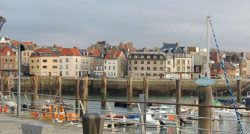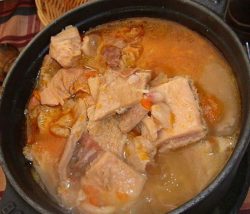 by Simone Sekers
by Simone Sekers
TRYING to play the glad game about leaving Brexit, I wondered whether, instead of all those smug Wrecksiteers going on about “getting our country back,” it might be possible to think about getting France back instead. This would restore the magic of that descent from the ferry in to the very heart of Dieppe, sniffing ecstatically at the mingled aromas of freshly baked bread, coffee, pungent French cigarette smoke and a soupçon of drains, wouldn’t it?
This was a crossing we would make frequently as we lived near enough to Newhaven to make it possible to do a day trip, and always that sensation of arriving in a foreign country made it feel as if we had travelled a very long way indeed. The South Downs were behind us, ahead were bowls of mussels steaming in the cold air as we tried to pretend it was warm enough to eat outside. Our glasses of very ordinary vin blanc misted over, and it was all so very different from the cup of tea and the flabby toast we had had before catching the boat. It was all so foreign, and therefore better.
My boyfriend’s parents used to do the crossing as regularly as a trip to the supermarket, bringing back those exercise books with squared pages instead of ruled ones and rulers marked in metric. Joan had a shopping bag of canvas, with leatherette handles which I thought was the epitome of French chic, and she tied a little scarf round her neck and put her hair up in a French pleat. Brian smoked not Gauloises, but Gitanes in the yellow papier mais, which made the cough he’d had ever since being one of Monty’s Desert Rats even worse. To me they had a wondrous ability to absorb all that was best about France – the baguette which had wilted by the time it got back to Newhaven, the properly ‘stinky’ cheeses, maybe a paperback edition of one of Colette’s novels, bought by Joan from a market stall in a vain attempt to improve her French, a bottle of red wine, impressively cheap, suitably rasping.
 By the time they got back to their own front door in the small house in Lewes, all this sloughed off them. Brian went back to his set lunch in the café in Brighton near his office – a cheese omelette, fried to shoe leather in lard, a slice of apple pie and custard and a cup of Camp coffee. Joan’s copy of Claudine a l’Ecole lay forgotten under the sheets of the play she was writing, the shopping bag just looked rather shabby in the grey English light.
By the time they got back to their own front door in the small house in Lewes, all this sloughed off them. Brian went back to his set lunch in the café in Brighton near his office – a cheese omelette, fried to shoe leather in lard, a slice of apple pie and custard and a cup of Camp coffee. Joan’s copy of Claudine a l’Ecole lay forgotten under the sheets of the play she was writing, the shopping bag just looked rather shabby in the grey English light.
Another boyfriend, and one who became my husband, meant another taste of France, this time in Lyon. A bedsit at the top of a tall grey building in a narrow street, where an anorexic prostitute with red hair stood under the street light where David parked his car before starting up the steep stairs, open to the elements and greasy with rain.
The first time she propositioned him, rather hopelessly as the car was not one that meant money, he told her that he had only been married a few months. She shrugged, smiled ruefully and said: “You won’t be needing me for a little while yet.” Would this have happened just off the Fulham Road we wondered, as he told me about this encounter.
Living in Lyon introduced us to slabs of tripe fried in egg and breadcrumbs and eaten with a sauce sharp with capers at a little restaurant five minutes walk away over slippery cobbles, or a range of goats’ cheeses from milky fresh to tiny waxy ‘trouser buttons’, sold with pale unsalted butter from the laiterie outside the door of our building. With a baguette this was lunch, to which my husband came home every day. The market was only ten minutes away and it was there I learnt most of my French, haggling over the cost of mackeral or carrots or whatever was cheap that morning.
 Once we were well and truly part of the Europe for which I voted with fervour, hoping that contact with Abroad would banish the greyness and drabness of post-war Britain and make us less smug about having Won The War, our attitudes to France and to Europe generally began to change. Shopping in French supermarkets began to be as bland as shopping anywhere – everything packaged, with ingredients and instructions in several different languages. You could buy Camembert in Sainsburys in the same boxes as those sold in the Mammoth outside Calais.
Once we were well and truly part of the Europe for which I voted with fervour, hoping that contact with Abroad would banish the greyness and drabness of post-war Britain and make us less smug about having Won The War, our attitudes to France and to Europe generally began to change. Shopping in French supermarkets began to be as bland as shopping anywhere – everything packaged, with ingredients and instructions in several different languages. You could buy Camembert in Sainsburys in the same boxes as those sold in the Mammoth outside Calais.
The food got better in England, and rather worse in France. We began to invent new cheeses and resurrect the traditional ones, but the French stuck to the same old things, La Vache Qui Rit piled high in the trolleys of harassed French mothers rather than the Epoisses and Comte in the chilled cabinets. Each wine buying trip we bought less and less food to bring back with us. Why bother, when you could buy such things in Somerset as home-grown frisée lettuces and shiny fennel bulbs.
This morning, a cold bright one on the day after May’s Hard Brexit speech, we were in the weekly market in Wells. The sun shone on the medieval buildings, on the stalls offering a range of things from ethnic carpets to roasted mammoth bones for dogs. The apple man was there, his beautiful locally grown apples golden tempting. The scent of frying sausages and freshly brewed espresso coffee hung in the air, the fish stall had squid and red mullet and a huge turbot and Dover soles, most from the Cornish coast and glutinous with freshness, the game stall offered wild rabbit and pigeon breasts and braces of pheasant complete with bacon rashers. There was a cornucopia of fresh kale – black, purple, green – proper sprouting broccoli, tiny rosette sprouts, Savoy cabbages. After shopping for all this bounty, we could go and lunch at nearby Goodfellows and have a better lunch than we would get in Cherbourg.
It’s not our country we have got back – perish the thought – but a country that has learned the value of eating well and living well. We have gained immeasurably from being part of Europe, just as long as we don’t return to the bad old days. It’s just possible that, once we have to show our passports again, France will regain its status as a foreign country. That might just lift the gloom a little.
Pictured: Dieppe harbour; Tripes a la Lyonnaise; Wells Market Place with the Cathedral in the background.